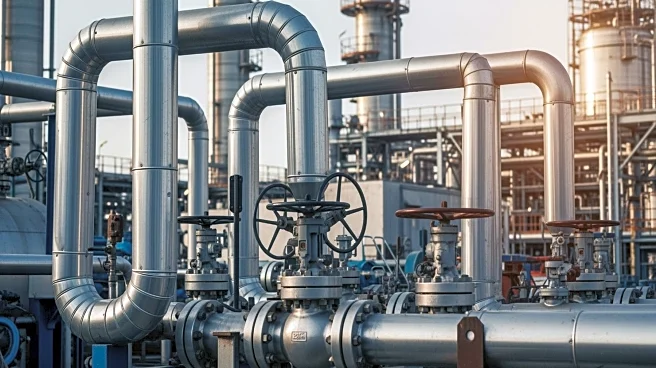What's Happening?
The Dangote Petroleum Refinery in Nigeria plans to expand its processing capacity from 650,000 barrels per day to 1.4 million barrels per day, positioning it as the largest refinery globally. This expansion
is expected to generate approximately 65,000 jobs and enhance industrial development within Nigeria's economy. The upgrade will include improvements in petrochemical output and adherence to Euro VI fuel standards, promoting cleaner energy production. The refinery aims to achieve full operational independence from the national grid by expanding its power generation capacity.
Why It's Important?
The expansion of the Dangote Refinery represents a significant boost to Nigeria's industrial sector, potentially transforming the country's energy landscape. By increasing capacity and adopting cleaner fuel standards, the refinery could enhance Nigeria's position in global energy markets and contribute to environmental sustainability. The creation of thousands of jobs and investment in local skills development underscores the project's economic impact, fostering growth in related industries and supply chains. This development may also encourage other energy projects in Nigeria, supporting the country's long-term energy security and economic diversification.
What's Next?
The expansion project is set to commence, with a focus on completing the upgrade and achieving operational independence. The refinery's commitment to listing shares on the Nigerian Stock Exchange could open investment opportunities for local stakeholders. As the project progresses, stakeholders may monitor its impact on fuel supply stability and industrial growth. The government and private sector might explore further collaborations to enhance energy infrastructure and support additional refinery projects, ensuring Nigeria's energy independence and economic resilience.
Beyond the Headlines
The expansion of the Dangote Refinery highlights broader themes of energy independence and industrial growth in Nigeria. The project's focus on cleaner fuel standards aligns with global environmental goals, potentially influencing energy policy and sustainability practices. The emphasis on local workforce development and technology transfer reflects efforts to build domestic capacity and reduce reliance on foreign expertise, fostering long-term economic empowerment.









